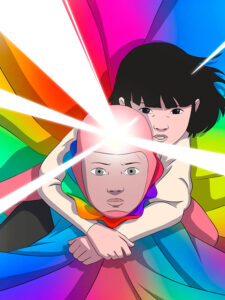And we arrive at the last day of this 38th edition of the Mostra de Valencia with two proposals, if you want more conventional, but, maybe for that very reason, effective, that come to us from neighboring France and Italy.
In Toni, with family, the young director Nathan Ambrosioni, turns its gaze towards the feminine world, protagonist of the majority of the stories in this edition of the contest. Toni is a woman already in the 40 who lives with his five children. Daily, Toni picks up her offspring, gives him dinner and, even though most of them are already in their teens, He doesn't get into bed until everyone is asleep.. The next day, She gets up first to move everyone around and the rest of the day is dedicated to housework.. From time to time, to liven up the clients' evening, some night she sings in a friend's restaurant. But Toni needs a change in her life. Something to get her out of the spiral of routines in which she feels trapped.. Good to know, besides, that Toni became, at the time, a very famous singer.

Con Toni, with family, Ambrosioni proposes a fable that speaks to us, above all, maternity. Supported by an impeccable script from a structural point of view, The film brings us closer to a group of perfectly defined characters with their own complexities.. A perfectly balanced choral work, where each of them has their space to develop. Those little conflicts, in contrast to the problems faced by our protagonist, holds the movie drama knot. As head of family (she is alone, we understand, after the death of her partner and father of her children), Toni has to divide her time between her family and herself. This contrast of interests, frequently, opposites, will define the struggle of our protagonist and the dilemma she will have to solve.
Trying to find new paths of fulfillment, Toni decides to recover her university studies, a decision that will not be well received. The struggle of affections and disaffections, of demands for protagonism from each of the members of this peculiar family will cause many contortions that will affect the very idea of motherhood that Toni is building.. Toni wonders to what extent she must sacrifice her own development for children who, at some point, They are going to abandon her to make their own life.

But the interesting thing about the proposal is that, in this case, Nathan Ambrosioni does not force the story on either side. His bet is coherent in his complex humanity. There are no safe roads. Filial affection is a winding journey full of obstacles, but each of them leads us to a process of maturity, both mother and children. In the end, there is a maternity, Yeah, accepted without complexes, but richer than the previous one.
Time is the other element that plays in this production. Time that inevitably passes. At your age, Toni seems to have assumed that her years as a music star have passed. In fact, He never had much affection for that world. However, that time gone by knocks on your door again and again, trying to drag her to the bottom. Time that passes and time that will come. Toni is at a crossroads. What was will no longer return and everything indicates that there is not much time left to build a new identity.. Your children are, however, at the beginning of that race. Ambrosioni handles with ease these sensations that, somehow, they fly over the story. Trying to get your life back on track, Toni has signed up for some orientation courses. In one of the sessions, meets with other people in the same situation as her. In the middle of a talk, The tutor asks another of the assistants how she sees herself in the next ten years. “Dead”, respond, incredulous, with languid sincerity. At what point do we end our future plans??

Nathan Ambrosioni's portrait of contemporary youth is just as rich. Ambrosioni shows his doubts and contradictions with sympathy and affection, your fears and obsessions, sometimes still childish, others more justified (the absence of the father, the duel again, will have its relevance). But this portrait remains in a balance in which the director wants to escape from that idea of a lost generation that appears in most of the coming of age and television series. Your characters may be lost, but they are intelligent and, in the end, They will prove to have plenty of tools to survive.
Y, in the background too, that notion of success that muzzles contemporary society. Somehow, everyone encourages Toni to recover her singing career. Her children are proud of her (y, somehow, They reproach him for abandoning her.), the press chases her, Her mother makes fun of her for wanting to go back to her studies... But, what is success really? Ambrosioni gives us a precise comedy that connects us, effectively and without technical or formal tightrope walking, with that pristine truth that good stories treasure.

But if we talk about choral stories, Strange love (o Fireworks in his international title), by the hitherto actor and debutante behind the camera Giuseppe Fiorello, It is the film that brings together the most characters of all those seen in the contest.
We are in a town in Sicily, in 1982, World Cup year. Here we will meet Gianni, a young man who works as a mechanic for his mother's lover. Gianni suffers the ridicule of the band of idle customers who meet every day in the bar in front of the workshop.. Rumors say that the boy has relationships with other men, which makes him fodder for gossip and violence among the townspeople.. He doesn't even have the support of his mother.. Much less from your partner, a rude man who also despises him. Fed up with this situation, Gianni runs away and looks for a new job. For this he will have the help of Nino, another boy his age who helps his father in a fireworks company that he accidentally met. A strong connection soon arises between them.. Then, that friendship will become something more. But, sustained by a strong pressure of taboos and customs, the townspeople will not let them live in peace.

It is not difficult to praise a film like Strange love. In a first approach, the desire appears to carry out an exercise of political denunciation on the question of tolerance towards homosexuality in the Italy of the 80. Based on real events, Giuseppe Fiorello tells us about the case of two boys who suffered the consequences of this social rejection with tragic consequences.. But, beyond the will to denounce that the facts themselves show, Fiorello's film stands out for its conscientious portrait of that same society..
On the one hand, there is the physical portrait, reconstruction of an era (the streets, all the art work), but also sociological and almost ethnographic. Fiorello draws attention to a social space that is increasingly less addressed by contemporary cinema (yes, Matteo Garrone, in a nearer time). It is the portrait of that popular society and how it is articulated around certain symbols such as football., religion, the family, etc.

But the interesting thing about this portrait is that, being very critical, Fiorello maintains, at the same time, a certain understanding look, there is even a certain nostalgia. Nostalgia for a cinema too, that of the golden age of neorealism that, somehow, honors. In one of the most emotional sequences of the film, Gianni and Nino have to prepare the fires for a town's festivities. when they arrive, The streets are closed for the procession of the local virgin. Fun, the two young people observe the scene. Yet, there is no resentment in them, nor suspicion, but affection.

But, above all, a psychological and sociological portrait of a society full of prejudices, Yeah, but also very human, even in his meanness. Fiorello's characters are not pieces forged in iron serving the sole purpose of the complaint, but they have layers, nuances. They are human and, therefore, i have, aman, they hate, betray and, with that, they betray themselves and those they say they love. But the most interesting thing about his proposal is that this double line of meanings moves at a level, obvious, but also very subtle. Fiorello does not need to state what he wants to say. There lies the mastery of the Italian director. Especially notable, in this sense, It is the relationship that Gianni has with his mother. Gianni wants to protect her, of herself and her lover, that keeps her. The mother, for his part, He wants to do the same with his son., but, in the end, social rules and prejudices can. However, there is no hate in his eyes, just confusion, misunderstanding and fear, maybe, for her son to be happier than her, which shows his own vital failure. Impressive Simona Malato in what is undoubtedly the most complex role in the film. A cinema of conscience, we could say, committed, but also done from intelligence and heart. GERARDO LEON











